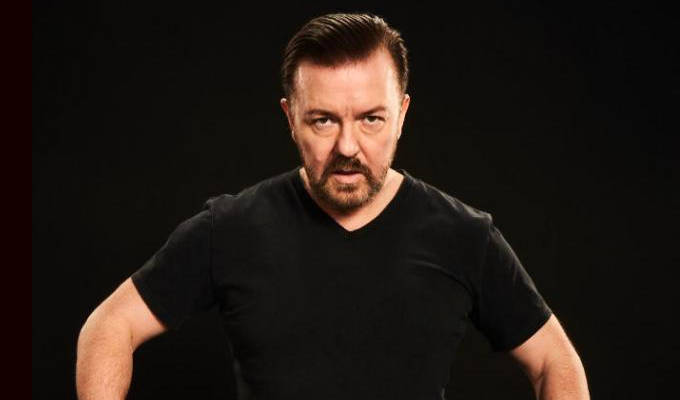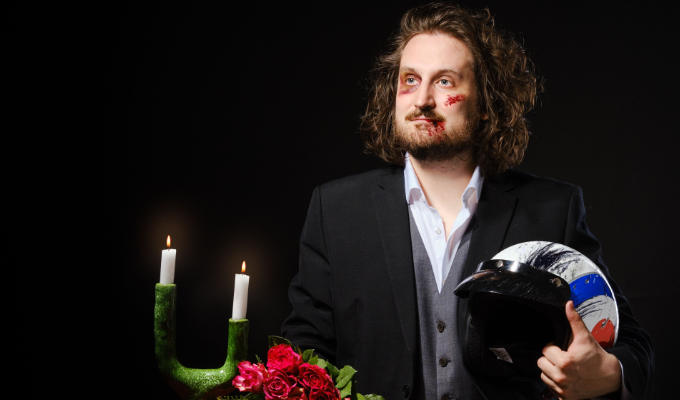
Ricky Gervais: Armageddon
Review of comic's tour as he works towards his next Netflix special
How nice it would be to write about Ricky Gervais without going over the same old ‘cancel culture’ talking points which so consumes those who rarely actually see live comedy.
But he’s the one leaning into it, setting himself up as the crusading defender of saying bad things in jest, whatever the wokey snowflakes say. A sincere postscript tells us comedy is like an inoculation, the way we learn to deal with the nasty things in life with a little unthreatening dose of reality.
His stance is posited as rebellious, although often there’s barely any distance between him and Jim Davidson or a Daily Mail editorial, sneering, for example, at how all those so-called refugees are all surprisingly strapping males…
Not that sanctimonious liberals should be off-limits for comedy – far from it. But too often, Gervais’s plan of attack is just totell off-colour jokes about paedophiles, Aids-ridden African babies, the Holocaust, rape, severely disabled kids, dwarves and paedophiles again. Sometimes the sheer brutality of these lines is crushingly effective, but the effect is diminished by constant repetition.
Any element of surprise is gone when all you ever do is voice the worst, most inappropriate things. Even if ‘saying the unsayable’ is at the core of this sort of sub-Sadowitzian bad-taste comedy, it’s not so much offensive – however much Gervais would like it to be – as dull. Like an excitable teenager testing boundaries, he sniggers away at how naughty he’s being as the grown-ups roll their eyes, hoping he’ll grow out of it. At 61, there’s little sign of that.
Yet there are plenty of fans for this brand of stick-it-to-the-liberals comedy and Gervais has exploited that more successfully than anyone else. His current batch of shows, relatively advanced works in progress towards the next money-spinning Netflix special, are announced just days ahead of time and sell out big theatres in minutes.
And it doesn’t take too long for the never-modest Gervais to mention that his last special, SuperNature, was the most-watched on the platform last year. And also one of the most contentious after Dave Chappelle's. In one small concession, Gervais now largely steers clear of the sort of material that attracted valid complaints of transphobia last time around.
Of course, we’re not supposed to literally believe everything he says. He sets himself up as an idiot early doors, the sort of guy so privileged and out-of-touch that he has his central heating and air conditioning battle it out, just because he’s wealthy enough that he can. That routine also serves as yet another reminder of his high status.
For Gervais is as tribal as those wokies he mocks. He laments political comics who get applause breaks just by telling liberal crowds precisely what they want to hear – conveniently oblivious to the fact he’s doing exactly the same with his more reactionary devotees. But in what a cynic would surely call virtue-signalling of his own, he does burnish his good-guy credentials, talking about his charity work or the money his expensively-priced premium tickets are raising for animal charities.
Armageddon adheres only very loosely to any theme about humanity might end. True to his message, he suggests millennia of evolution have allowed us to conquer all the dangers nature could throw our way – but are now wounded by words.
A minor but telling point is that he misrepresents Darwin’s ‘survival of the fittest’ axiom to assume it means the strongest Alpha Males pass on their genes – Andrew Tate would surely agree – when the phrase actually refers to the individuals best suited to their environment. Even more ironically, Gervais makes it a point of pride that he’s not evolving with the times.
A few lines nail his points about the censorious Left with finesse. There’s a lovely, slippery gag about cultural appropriation that ends where few could predict, a line about how we too easily throw around the word ‘fascist’ – and a joke about Chinese slave labour that highlights the issue, even while he affects zero sympathy for it. But these serve only to highlight how simplistic some of his other routines are, getting a knee-jerk laugh from words like ‘nonce’.
The delivery is stronger than the writing – though some of it’s from assimilation: he’s fully absorbed Stewart Lee’s sarcastic, sneery laugh, for instance. And he plays more to mischievous piss-taking than polemic, even though his position on the ‘free speech’ debate is always clear. But it’s also getting boring now.
Review date: 16 Mar 2023
Reviewed by: Steve Bennett
Reviewed at:
Woking New Victoria Theatre









